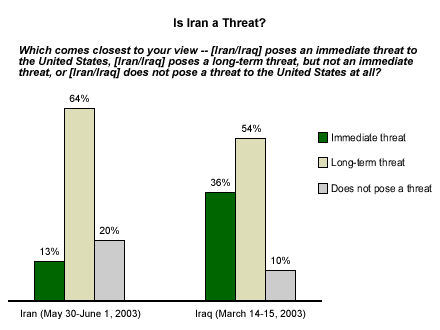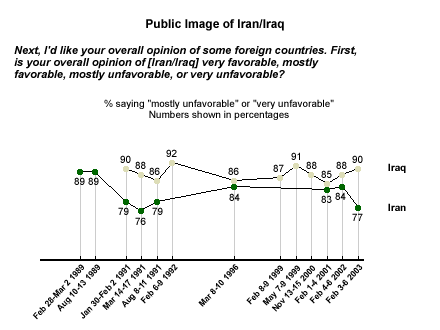Since the toppling of Saddam Hussein's regime, Iran -- another arm of President Bush's "axis of evil" -- has become more prominent as a potentially volatile threat in the Middle East. The Bush administration and others in the international community suspect the Iranian government of developing a secret nuclear weapons program. At the Group of Eight (G-8) industrial nations' summit last week, leaders of the eight countries issued a declaration that warned, "We will not ignore the proliferation implications of Iran's advanced nuclear programs." In addition to suspicions about its nuclear capabilities, Iran has been accused of harboring al Qaeda terrorists.
Just how big a threat is Iran to U.S. security? No one knows for certain, but Gallup posed this question to Americans in a May 30-June 1 poll*. Results show that the public is inclined to view Iran as a long-term, rather than an immediate, threat. Americans clearly do not feel as threatened by Iran as they did by Iraq just before the Iraq war.
Is Iran a Threat?
Respondents were asked whether Iran poses an immediate threat, a long-term threat, or no threat at all to the United States. Just 13% of Americans believe that Iran is an immediate threat, while nearly two-thirds (64%) feel Iran poses a long-term threat, but not an immediate threat. Two in 10 Americans (20%) do not believe that Iran poses a threat to the United States.
In comparison, on March 14-15**, just before coalition forces began their military campaign in Iraq, more than a third (36%) of Americans thought Iraq was an immediate threat, 54% felt Iraq was a long-term threat, and just 10% felt Iraq was no threat at all. As talk of war intensified, Americans were more inclined to view Iraq as an immediate threat. A poll conducted Jan. 31-Feb. 2 of this year found 29% of Americans saying Iraq was an immediate threat, and 61% saying it was a long-term threat.

Iran's Image in the Eyes of Americans
Gallup's annual World Affairs survey shows that the vast majority of Americans continue to view Iran negatively, as they have since the question was first asked in 1989. The Feb. 3-6 Gallup Poll*** found, 77% of Americans described their overall opinion of Iran as "mostly" or "very" unfavorable. Negative perceptions of Iran had actually waned slightly since February 2002 (just after the "axis of evil" speech), when 84% of Americans had an unfavorable view of Iran.
However, Americans' perceptions of Iran in the past few years have not been as negative as their perceptions about Iraq. The February poll showed that 90% held a negative opinion of Iraq in February 2003. No more than 9% of Americans have had a positive view of Iraq since 1991.

Bottom Line
Although the situation in Iran is beginning to receive more media focus, it is hardly the attention-grabber that the build-up to the Iraq war was two months ago. So it's no surprise that the level of concern people have about Iran does not yet match the level of concern people had about Iraq in March. But given Americans' long-term negativity toward Iran, and Bush's characterization of it as an oppressive nation, the U.S. public's assessment of its regime as a potential threat may grow as media coverage of its nuclear capabilities intensifies.
*Results are based on telephone interviews with 1,019 national adults, aged 18 and older, conducted May 30-June 1, 2003. For results based on the total sample of national adults, one can say with 95% confidence that the margin of sampling error is ±3%.
**Results are based on telephone interviews with 1,007 national adults, aged 18 and older, conducted March 14-15, 2003. For results based on the total sample of national adults, one can say with 95% confidence that the maximum margin of sampling error is ±3%.
***Results are based on telephone interviews with 1,001 national adults, aged 18 and older, conducted Feb. 3-6, 2003. For results based on the total sample of national adults, one can say with 95% confidence that the maximum margin of sampling error is ±3%.
